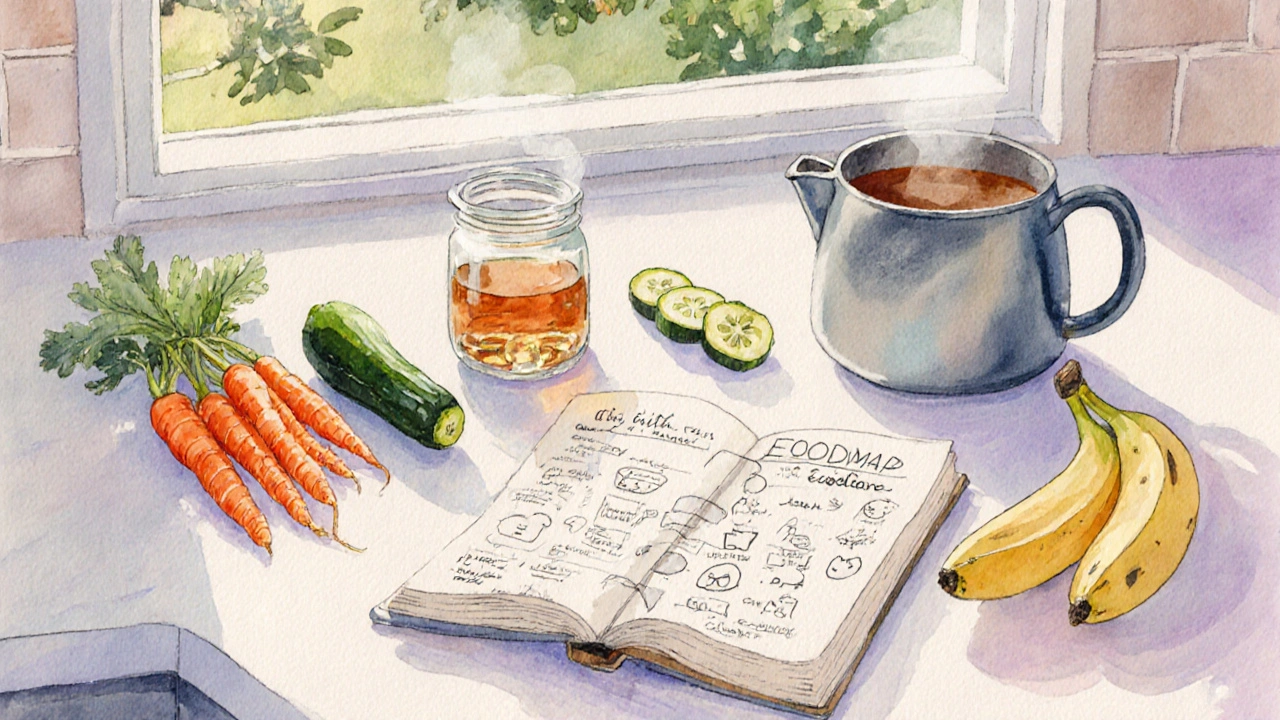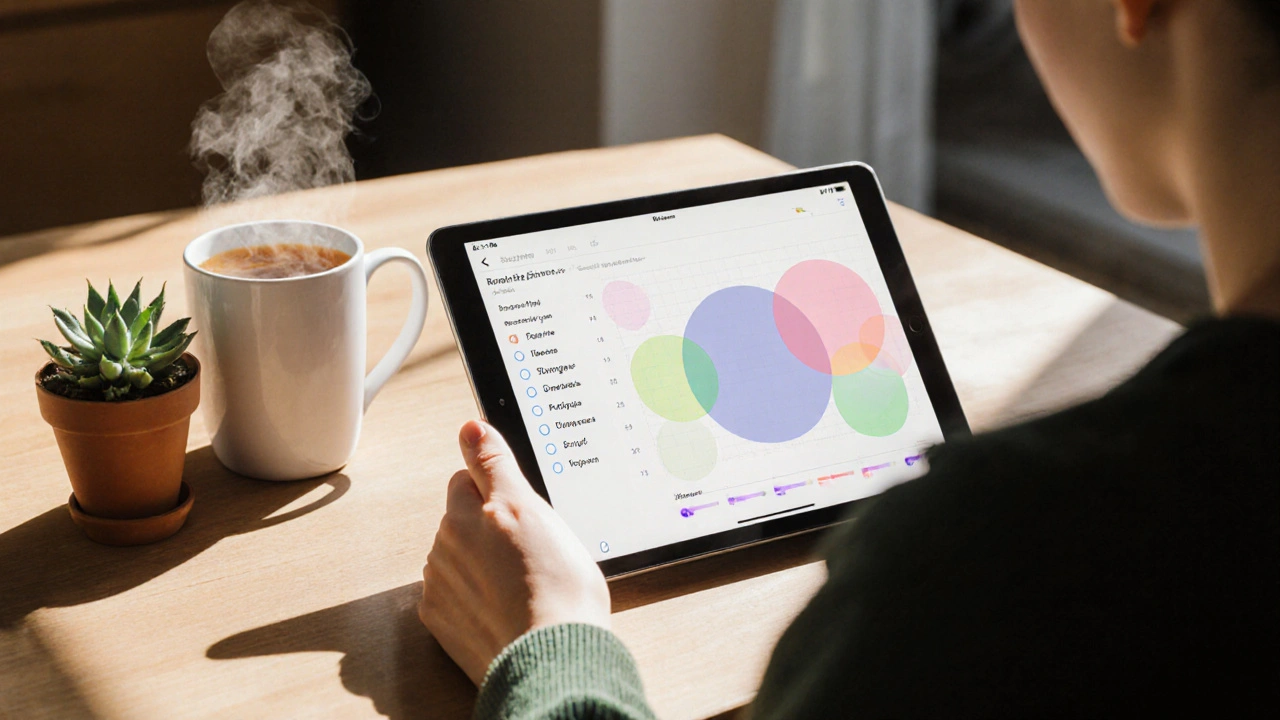Colitis Symptom Tracker
Finding a way to enjoy daily life while dealing with Colitis is a chronic inflammation of the colon that can cause pain, fatigue and urgent bathroom trips can feel overwhelming. The good news? You don’t have to go it alone. Below are proven coping tactics, everyday adjustments, and a curated list of support resources that help turn a tricky diagnosis into a manageable routine.
Understanding the Landscape: What Exactly Is Colitis?
Colitis sits under the umbrella of Inflammatory Bowel Disease (IBD), the same family that includes Ulcerative Colitis, where inflammation is limited to the colon lining, and Crohn's disease, which can affect any part of the digestive tract. While each condition has its nuances, the core challenges-unpredictable flare‑ups, diet anxiety, and mental strain-are shared.
1. Food as Medicine: Diet Tweaks That Really Work
Adjusting what you eat isn’t about a strict “no‑go” list; it’s about pinpointing personal triggers. A low‑FODMAP approach, where you limit fermentable sugars, has helped up to 70% of patients reduce bloating and urgency (study by Monash University, 2023). Here are three starter steps:
- Keep a simple food journal for two weeks; note meals, symptoms, and timing.
- Introduce one low‑FODMAP food at a time-think carrots, zucchini, or unripe bananas.
- Re‑introduce higher‑FODMAP items slowly to see if they truly cause trouble.
Don’t overlook Probiotics live bacteria that can rebalance gut flora. A 2022 meta‑analysis showed that specific strains like Bifidobacterium infantis cut down abdominal pain in 45% of participants. A daily capsule at breakfast is a low‑effort experiment worth trying.
2. Stress Management: Calm Your Gut, Calm Your Mind
Stress and gut inflammation are linked via the gut‑brain axis. Simple mindfulness practices-5 minutes of focused breathing, a short walk, or a grounding activity-lower cortisol and can shrink flare‑up frequency by roughly 30% (HarvardHealth, 2024).
Create a “stress‑buffer” routine:
- Pick a consistent bedtime; aim for 7‑8hours.
- Schedule three short “reset” moments each day-stretch, meditate, or sip herbal tea.
- Log your mood alongside your food journal to spot patterns.
3. Physical Activity: Move Without Aggravating
Gentle movement improves bowel motility and boosts mood. Low‑impact aerobics, yoga, and swimming keep joints safe while strengthening the core, which supports the abdomen during flare‑ups. A 2021 Australian cohort found that walking 30minutes a day reduced the need for rescue medication by 22%.

4. Medication Adherence: Partner With Your Gastroenterologist a specialist who oversees IBD treatment plans
Even the best lifestyle tweaks can’t replace prescribed therapy. Whether you’re on mesalamine, biologics, or steroids, taking meds exactly as directed keeps inflammation in check and prolongs remission. Set phone reminders, use a pill organizer, and schedule quarterly check‑ins to discuss any side effects.
5. Recognizing Remission vs. Flare‑Up
“Remission” means your symptoms are minimal and inflammation is low. Indicators include steady stool consistency, lack of abdominal pain, and normal blood markers like C‑reactive protein. When you notice sudden urgency, blood in stool, or fever, you’re likely entering a flare‑up. Acting fast-adjusting diet, increasing hydration, and contacting your doctor-can shorten the episode.
6. Building a Support Network
Isolation fuels anxiety, so connecting with others who “get it” is essential. Below is a quick‑look table of the most reliable resources, from local meet‑ups in Melbourne to global online hubs.
| Resource | Type | Key Benefit | How to Join |
|---|---|---|---|
| IBD Australia | National charity | Free helpline, webinars, local chapter events | Visit their website and sign up for newsletters |
| MyCrohnsAndColitisTeam | Online forum | Peer‑to‑peer advice, anonymous posting | Create a free account and introduce yourself |
| Meetup: Melbourne IBD Support | Monthly in‑person group | Local connection, shared meals, speaker sessions | Register via Meetup.com; first meet‑up is free |
| Reddit r/IBD | Social media community | 24/7 Q&A, memes to lighten mood | Join with a Reddit account; browse the “Newcomer” guide |
| Beyond Crohn’s Foundation | International charity | Research updates, grant programs, virtual retreats | Sign up for email alerts; they offer a free “starter kit” |
7. Mental Health Matters
Living with a chronic condition can trigger anxiety and depression. Studies from the University of Sydney (2023) show that 1 in 3 IBD patients meet criteria for moderate depression. Talking therapies-CBT or acceptance‑commitment therapy-have reduced symptom‑related stress by up to 40%.
Consider these low‑cost options:
- Free 8‑week CBT program offered by local health districts.
- Mindfulness apps (Insight Timer, Smiling Mind) with dedicated IBD tracks.
- Peer‑led “talk circles” run by IBD Australia.
8. Practical Day‑to‑Day Hacks
Small changes often have outsized impact. Keep these in mind when you’re out and about:
- Carry a discreet “IBD kit” with wipes, a spare change of underwear, and a small anti‑diarrheal tablet (as prescribed).
- Scout restroom locations before you sit down at a café; apps like Toilet Finder show nearest public facilities.
- Wear breathable, loose‑fitting clothing to reduce abdominal pressure during flare‑ups.
Implementing a handful of these tactics can shift your experience from “surviving” to “thriving” despite colitis. Remember, the journey is personal-test, adjust, and lean on the community when you need a boost.

Frequently Asked Questions
Can diet alone put colitis into remission?
Diet is a powerful tool but it usually works best alongside medication and regular monitoring. A tailored low‑FODMAP or specific carbohydrate diet can lessen symptoms and may extend periods of remission, yet most experts recommend keeping medical therapy in place.
How often should I see my gastroenterologist?
If you’re stable, a check‑up every 6‑12months is typical. During a flare‑up or if you’re starting a new medication, schedule an appointment within two weeks.
Are probiotics safe for everyone with colitis?
Most people tolerate probiotics well, but those with severe immunosuppression should discuss specific strains with their doctor before starting.
What’s the best way to find a local support group?
Start with national charities like IBD Australia-they list chapter meetings. You can also search Meetup.com for “Melbourne IBD” or join online forums and ask members for in‑person meetup recommendations.
When should I consider a mental‑health professional?
If feelings of anxiety, sadness, or hopelessness interfere with daily life-or if you notice stress worsening your GI symptoms-reach out to a counselor, psychologist, or psychiatrist. Early intervention can prevent more serious mood disorders.


10 Comments
David Lance Saxon Jr.
We must confront the ontological paradox of chronic inflammation: the gut becomes a battlefield where the immune system, armed with cytokine artillery, mistakenly attacks benign mucosal tissue, thereby transmuting ordinary digestion into an existential crisis. In this dialectic, the patient oscillates between agency and pathology, a liminal state that demands both epistemic humility and tactical rigor. By deploying a low‑FODMAP regimen, one engages in a form of nutritional semiotics, decoding the lexicon of fermentable substrates that provoke dysbiosis. Simultaneously, adherence to pharmacologic protocols operates as a covenant of trust between clinician and subject, a fiduciary exchange that stabilizes the immunological cascade. Ultimately, mastery over colitis arises not from a naïve hope of eradication, but from a disciplined orchestration of diet, stress modulation, and evidence‑based therapeutics.
Moore Lauren
Stay strong and keep moving forward!
Jonathan Seanston
Hey buddy, just wanted to say that logging your meals and stress levels can feel like a chore, but it actually builds a map of triggers that you can navigate around. When you notice a pattern, swapping out that one guilty‑pleasure snack for a low‑FODMAP alternative can save you a whole day of misery. Keep at it, the data will pay off.
Chelsea Hackbarth
Did you know that probiotic strains like Bifidobacterium infantis have been shown to reduce abdominal pain? 🦠✨ It’s a tiny ally that can make a big difference.
Adam Shooter
The pathophysiology of colitis is a quintessential example of dysregulated mucosal immunity, wherein innate and adaptive pathways intersect in a maladaptive feedback loop.
Such a loop is perpetuated by an overexpression of pro‑inflammatory cytokines, notably TNF‑α, IL‑6, and IL‑1β, which orchestrate epithelial barrier disruption.
From a mechanistic standpoint, barrier compromise begets microbial translocation, which in turn fuels further immunologic activation, creating a self‑propagating spiral.
Clinically, this translates into the classic triad of abdominal pain, urgency, and diarrheal output, each symptom reflecting a distinct facet of the underlying inflammatory cascade.
The therapeutic armamentarium, therefore, must be multipronged, integrating anti‑inflammatory agents, barrier‑restorative nutrition, and psychosomatic modulation.
Mesalamine, for instance, exerts its effect through topical inhibition of cyclooxygenase pathways, attenuating local prostaglandin synthesis.
Biologic agents such as infliximab achieve systemic remission via neutralization of TNF‑α, thereby dismantling a pivotal node in the cytokine network.
However, pharmacologic monotherapy is insufficient without concomitant lifestyle optimization, which serves as an ancillary regulator of inflammatory tone.
Low‑FODMAP dietary protocols operationalize the concept of substrate restriction, thereby diminishing luminal osmotic load and microbial fermentative by‑products.
Empirical data from randomized controlled trials demonstrate that a systematic reduction in fermentable oligosaccharides can curtail bloating episodes by up to 45 percent.
Stress, mediated through the hypothalamic‑pituitary‑adrenal axis, augments intestinal permeability via cortisol‑induced tight‑junction remodeling.
Consequently, mindfulness‑based stress reduction (MBSR) and structured aerobic activity constitute non‑pharmacologic adjuncts with quantifiable impact on disease activity indices.
In practice, adherence to a regimented symptom‑journal facilitates temporal correlation analysis, enabling clinicians to fine‑tune therapeutic dosing.
Moreover, patient empowerment through education mitigates the psychosocial burden, which is empirically linked to flare‑up frequency.
Ultimately, a holistic, evidence‑driven paradigm that synergizes biomedical interventions, dietary precision, and stress mitigation yields the most robust remission outcomes.
Fae Wings
Wow, that deep dive really hits home – it’s amazing how every piece fits together like a puzzle. 😌 Knowing the why behind each step makes the daily grind feel purposeful.
Anupama Pasricha
The integration of cytokine profiling with dietary modulation offers a nuanced framework that respects both immunological and metabolic dimensions, fostering a truly personalized management plan.
Bryce Charette
Just a quick heads‑up: when you list meds, try using commas consistently and keep the verb tense uniform – it makes the whole thing way easier to follow.
Christina Burkhardt
Don’t forget to check out the “IBD Australia” helpline; they’ve got webinars that break down the science in plain English. 📞
Rebecca Bissett
Having colitis, you know, isn’t just about occasional stomach aches, it’s about constant vigilance, relentless planning, and the occasional panic, especially when you’re out, and the nearest restroom is miles away, but with the right toolkit, you can stay ahead of the curve.